First day back at school has 'gone well', say heads
- Published
- comments
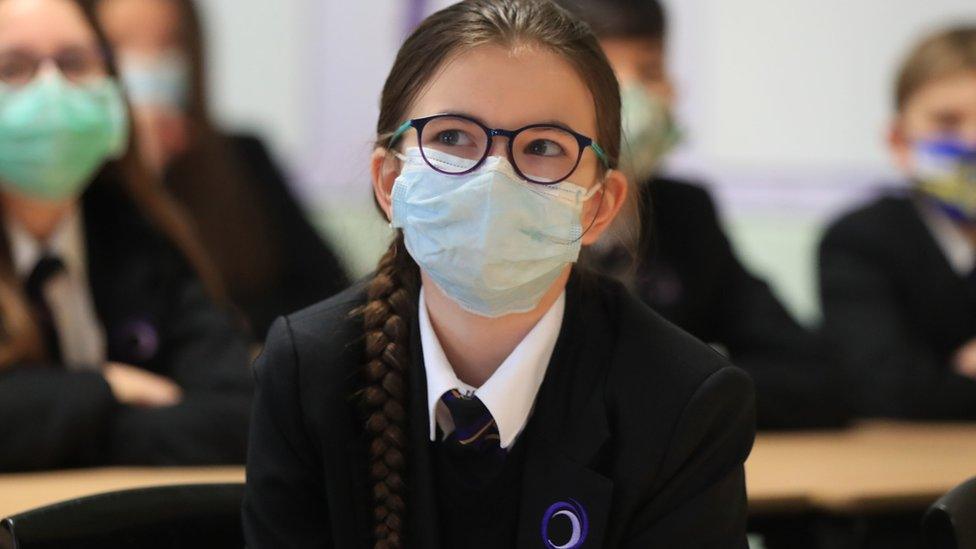
First day back at school in Doncaster, but there are now face masks in classrooms
The first day back at school for millions of children in England has "gone well", say head teachers.
They are reporting high levels of take-up of Covid tests and compliance with new rules on wearing masks in secondary school classrooms.
Primary schools have opened in full, but most secondary schools are phasing a return to allow time for Covid tests.
Prime Minister Boris Johnson described it as a "big day and an emotional day" for families.
At a Downing Street press conference he thanked parents for teaching their children at home: "We all know that the burden has disproportionately fallen on women - often holding down jobs and providing childcare at the same time."
A decline in the number testing positive, with a daily figure of 4,712, and over the past seven days 41,225 - down by 26%
For deaths within 28 days of a positive test, the daily figure is 65 and 1,441 in the past seven days - down by 34%
There were 688 patients admitted to hospital, 5,416 over the past seven days - down by 30%
22,377,255 people have been vaccinated with a first dose.
After more than two months of studying at home, pupils have gone back to the classroom - and an instant survey from the ASCL head teachers' union suggests attendance levels are "good" and Covid testing is going ahead as planned.
Masks and testing
The snapshot of more than 700 secondary schools found take-up of Covid tests as being between 90% to 100% in more than half of schools, between 80% and 90% in a quarter. But in about one in 20 schools, take-up for testing was below 60% of pupils.
The Covid tests, with swabs of nose and throat, are voluntary - and there had been warnings that getting parental consent had been the biggest difficulty.
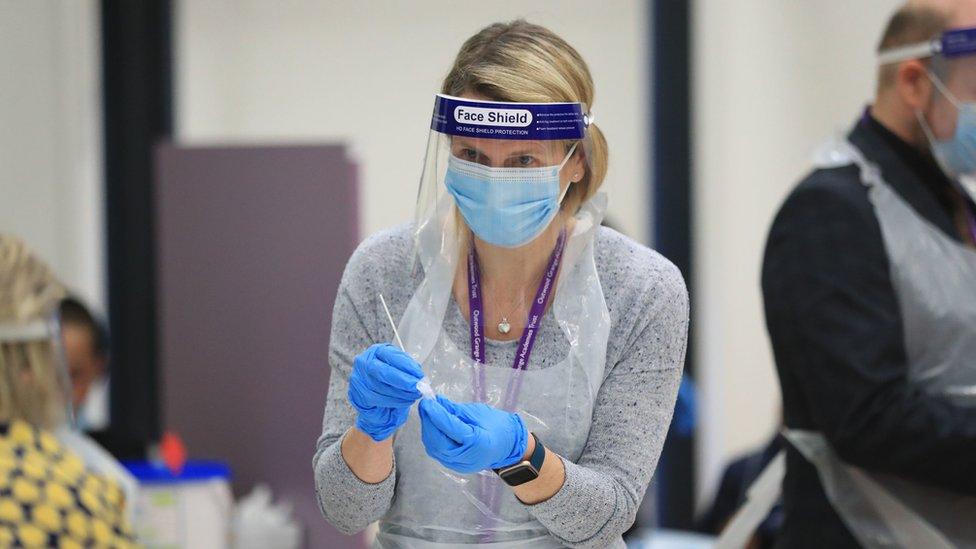
Secondary pupils will have three Covid tests in school
Secondary pupils are asked to take three tests in school before switching to being tested twice a week at home.
Head teachers also reported that in nearly three quarters of secondary schools, 90% of pupils were complying with wearing face masks in classrooms, where social distancing is not possible.
"These early indications are very encouraging," said ASCL leader Geoff Barton.
Although "strongly recommended" by the government, it is not compulsory for pupils to wear masks.
Children's Minister Vicky Ford said some students might be "very anxious and nervous" about them.
Testing but no exams
This fourth big return to school in England since the start of the pandemic comes with questions about catching up on missed lessons, young people's wellbeing and a replacement exam system.
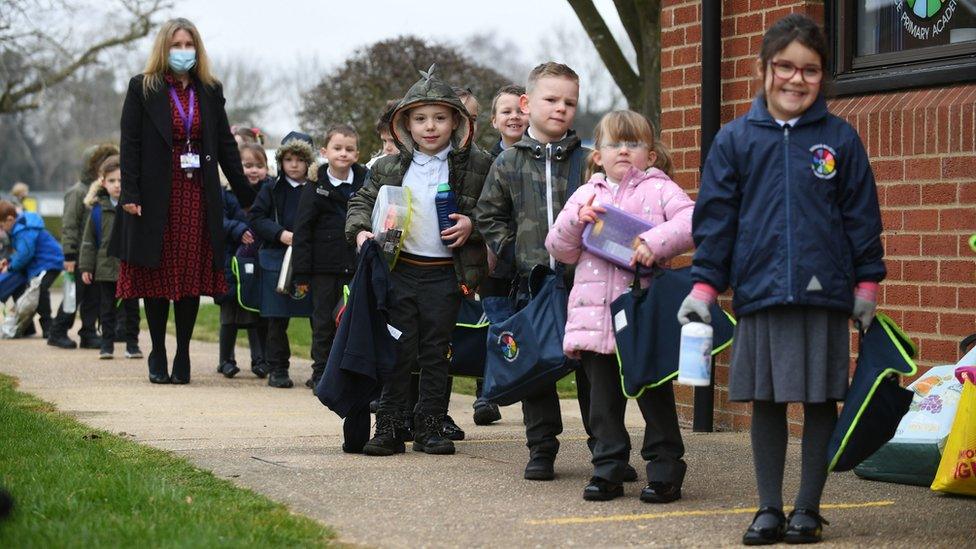
Pupils in Norfolk lining up for their first day back
The government is considering measures to help pupils, including longer school days and shorter holidays, according to Education Secretary Gavin Williamson.
Labour leader Sir Keir Starmer, visiting a school in East London, said "the government may need to look more closely at testing arrangements as they're rolled out" to avoid "lots of groups or classes having to self-isolate".

View from a school: "It's nice to see my friends"
At Bexleyheath Academy in south-east London, pupils were returning on Monday morning with a mixture of excitement and nervousness, reports Jeanette Long.
Tomisin, 15, told the BBC: "I just know that I'm ready for school, because it's been quite a long time being at home doing online school. It's nice to see my friends and people that I used to talk to a lot."
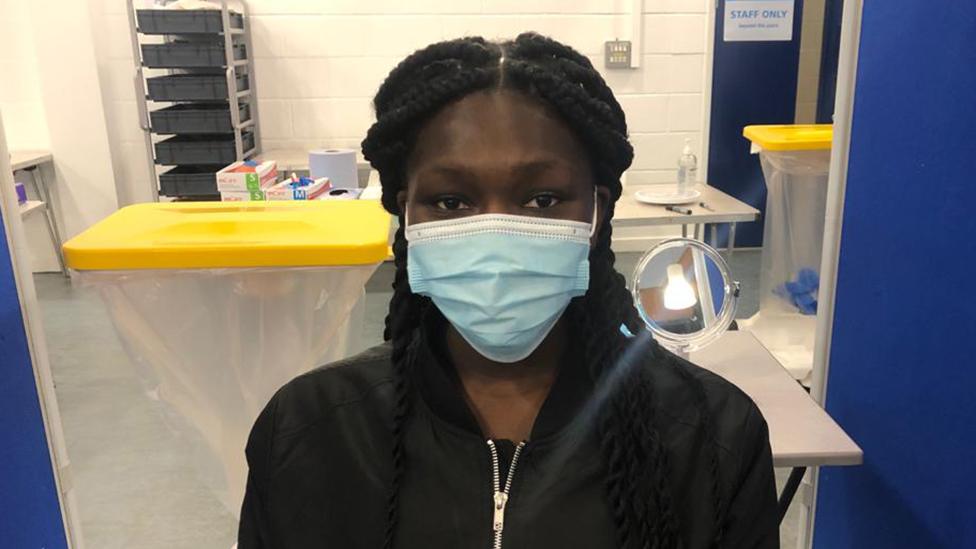
Tomisin is glad to get back to school
Tomisin feels she has missed some parts of her learning, but is "just hoping I can do my best" in upcoming tests.
Joseph, 15, says he is glad to get back to school as it will be easier to work than at home: "The telly, phone, family - it's really easy to get distracted.
"At home I've been able to do all my assignments, but there are a lot of distractions."
But he was a bit nervous about taking a Covid test: "The whole process is a bit nerve-racking."
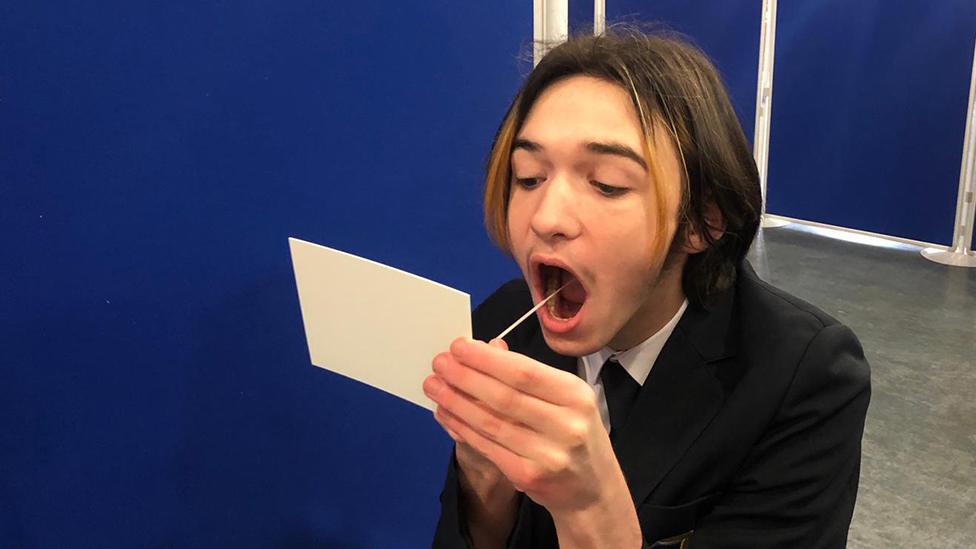
Joseph was nervous about doing the Covid test
Vic, 15, is also glad to be back in school: "I am very excited to be back, but there obviously is that bit of nervousness. But I feel safe and I know that the school will put my best interests first."
She says wearing a mask can be difficult but accepts the new guidelines.
"It is tricky because you want to take it off and you want to be able to get a bit of ventilation and you want to be able to talk to the teacher without having to think about the mask.
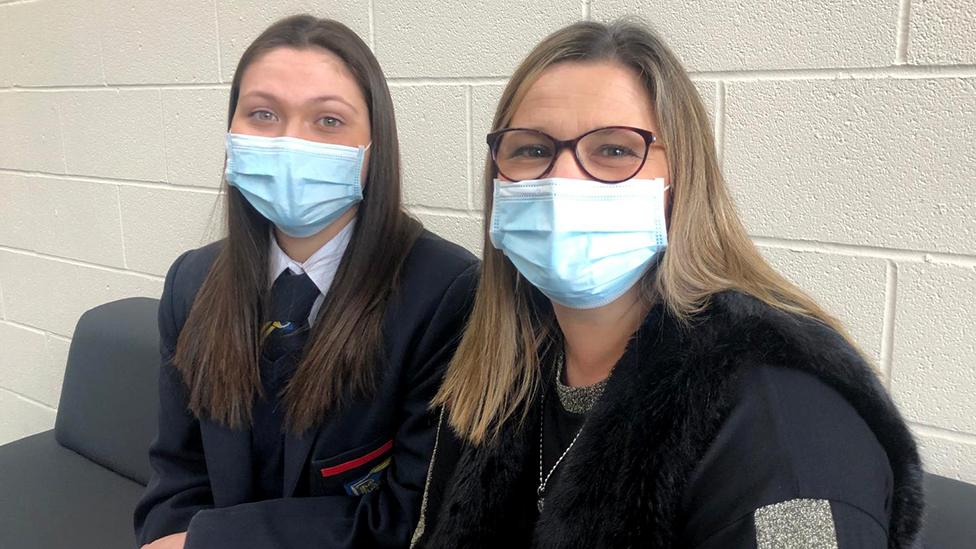
Vic and her mum are ready for "a bit of routine"
"But, if we've got to do it then we've got to do it - it's the guidelines so we've got to just abide by it."
Vic's mother Alison says the school has done everything it can to make the premises safe.
"So I'm happy that's she's happy and is ready to return - I think we all need a little bit of normality back in our lives and a bit of routine, so it's good that we've got to this stage I think."

Jules White, head of Tanbridge House School in Horsham, West Sussex, said the return brought a mix of "immense relief tied to a little apprehension" and meeting friends would be as important for pupils as getting back to learning.
In his school of 1,500 pupils, testing began last week and the phased return will stretch into next week.
The PM says the work of teachers and parents juggling home-school has been "astonishing"
Ryedale School in Nawton, North Yorkshire, tested all its pupils last week and all year groups will return to face-to-face teaching from Monday.
Parents supporting
Primary schools have opened for all pupils - but they will not have to take Covid tests or wear masks.
The challenge is to "support pupils socially and emotionally, not just academically", said Paul Whiteman of the National Association of Head Teachers.
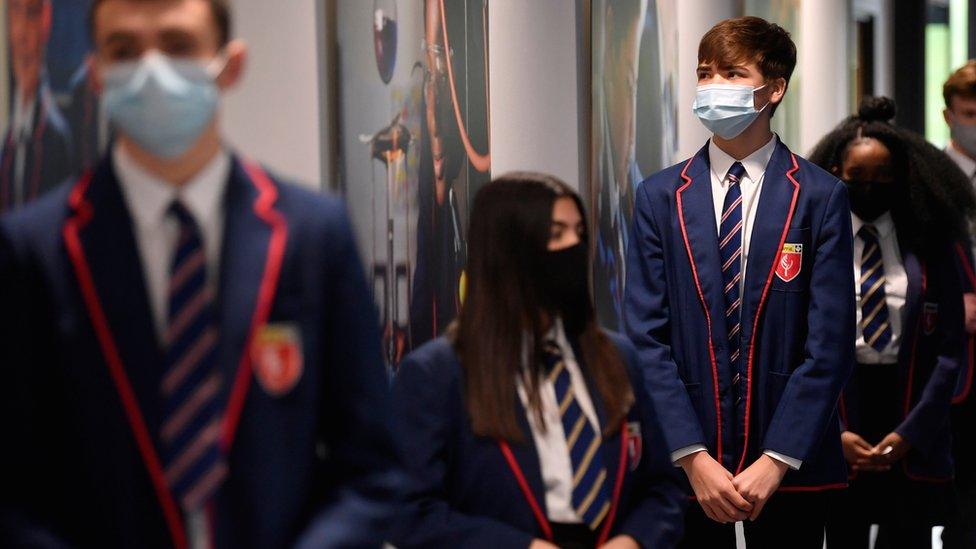
Queuing for Covid tests at the Harris Academy Beckenham
UK chief medical adviser Prof Chris Whitty has said "everything is strongly in favour" of pupils returning to school - with extra safety measures in place, such as testing, the wider use of masks and an early "natural firebreak" of the Easter holidays.
A survey of 6,000 parents from the Institute for Fiscal Studies found widespread support for the return to school - with nine in 10 saying they would have sent their children back even if it had not been compulsory.
But two-thirds of parents were "concerned that their child has lost out on learning".
Catch-up classes
But for many pupils, apart from one day in January before the lockdown, this will be the first week back in school this year.
The ambition is that this fourth return - following the short-lived attempt in January and returns last June and September - will be the last needed.
The government has appointed Sir Kevan Collins as an "education recovery commissioner", who will begin the process of helping pupils make up for the disruption and lost time in school.
The latest lockdown has seen the cancellation of A-level, GCSE and vocational exams, and pupils will return to study for a new system based on teachers' grades.
Ofsted inspectors have warned that disadvantaged children are more likely to have been adversely affected - and the government has announced £1.7bn to support catch-up schemes, such as tutoring and summer clubs.
Video diary: Triplets return to school
There have been concerns about children's mental health during the pandemic - and a study by researchers at the universities of Essex, Surrey and Birmingham reports a "significant rise in emotional and behavioural difficulties".
In Scotland, younger primary pupils went back last month - with more primary and secondary years returning from 15 March.
In Wales, younger primary pupils went back last month, with further primary and secondary groups back between 15 March and mid-April.
In Northern Ireland, younger primary pupils are returning on 8 March, with some secondary years starting 22 March.
England's Education Secretary Gavin Williamson said the return to school would be a "moment of joy" when students would get back to their teachers and friends.
"I do not underestimate how challenging the last few months have been with some children in class and most at home, but I do know how important it is for all children to be back in school, not only for their education but for their mental health and wellbeing," said Mr Williamson.